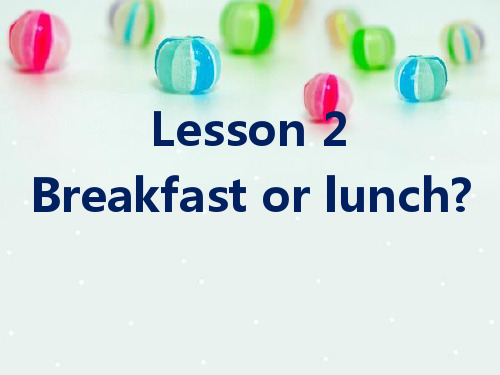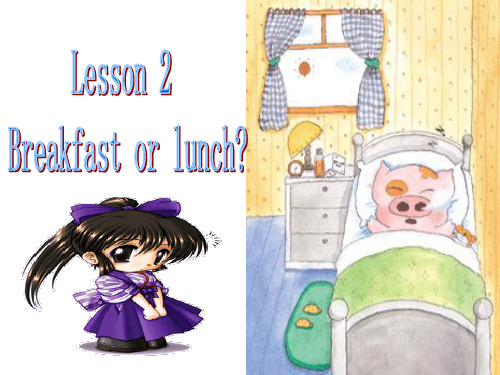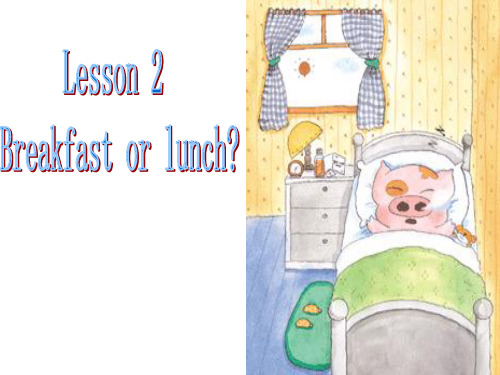NCE2-1 新概念二 第2课课件
新概念英语第二册第二课课件

Lesson 2 Breakfast or Lunch1. get: 获得,取得,得到,收到Did they get any compensation when they were dismissed from their jobs?I must get some fruit in the market.经典用法: get sth. done联想: get on 进展; 上车get offget up2. stay: (1) 停留(2) 暂住;逗留;作客The doctor told him that he would have to stay in hospital for another two weeks.In my letter, I told her that she could stay with us.经典用法: stay at home 呆在家里stay away [out] 不在家stay overnight 住一夜3. look: 看;注视(2)看起来;好像The teacher told us to look at the blackboard.That looks like an interesting film.(3)(与for连用)找,寻找The children were looking for a ball.This guest house is full. We must look for rooms elsewhere.(4)(与into连用)调查The mayor promised to look into the matter.经典用法: (1) look after 照料My friend looked after my cat while I was on holiday.Robert's old enough to look after himself.(2) look down on 轻视,看不起(3) look forward to 盼望;期待:We are all looking forward to our holiday.I'm looking forward to seeing you this summer vacation.(4) look out 注意Look out, there's a car coming. 留神,汽车过来了。
新概念二Lesson2(共20张PPT)精品课件

• It’s 8 o’clock.
• It’s cold.
• It’s 3 kilometers from my home to school.
Lesson 2 Breakfast or lunch?
• 周末的早上总是睡懒觉的好时候。但 是,当懒洋洋的你一觉醒来,发现到 了中午或者接近中午的时候,吃饭成 为一件令人头疼的事情。早饭,太晚; 午饭,太早。大洋彼岸的美国人也经 常为此烦恼,还为此演绎了一种独特 的饮食文化——早中饭(brunch)
频度副词一般放在主语之后, 实义动词之前 如果是be动词,放在be动词之后 He is often late for school.
Present continuous tense现在进行时
• 构成:主语+am/ is/ are + 现在分词 • 功能: • ⑴ 表现在正在进行的动作。 I’m still having breakfast. I am reading in bed now.
功能: • ⑴ 表现在的事实、状态或动作: • eg: Birds fly. She loves music. • ⑵ 表习惯性动作, • 常与usually, always ,often, frequently, ever ,
every day, sometimes, rarely, never 频度副词连用。
雨才停了。
• ring:
n 戒指, 电话 • Lord of rings 《指环王》 Vt ring sb=call sb = telephone sb 给。。打电话 • 大拇指thumb 食指index finger 中指middle
新概念英语第二册第二课精品ppt课件

ring [rɪŋ]v. 铃, 电话铃响,门铃 ring-rang-rung
The door bell is ringing. n. 戒指,指环 earring 耳环
a wedding ring 结婚戒指
男性: uncle, (叔叔,伯伯,舅舅,伯父)
aunt [ɑːnt] n. 女性长辈(姑母, 他们的孩子:cousin 堂兄妹,表兄妹
5
Practice
1. ( B ) When Aunt Lucy telephoned
A. the writer was asleep.
B. the writer was still in bed.
C. the writer had already got up. D. the writer was having lunch.
rudely [ˈruːdli] adv. 无礼地,粗 rude adj.粗鲁的
鲁地
反义词:polite adj.礼貌的
3
Text
It was Sunday. I never get up early on Sundays. I sometimes stay in bed until lunchtime. Last Sunday I got up very late. I looked out of the window. It was dark outside. ‘What a day!’ I thought. ‘It’s raining again.’ Just then, the telephone rang. It was my aunt Lucy. ‘I’ve just arrived by train’, she said. ‘I am coming to see you.’ ‘But I am still having breakfast, ’ I said. ‘What are you doing?’ She asked. ‘I am having breakfast,’ I repeated. ‘Dear me!’ She said. ‘Do you always get up so late? It’s one o’clock!’
新概念2 第2课(共36张PPT)

• ★aunt n. 姑,姨,婶,舅妈 • (所有长一辈的女性都用这个称呼) • 男性则是uncle: 叔父,伯父,姨丈 • 他们的孩子:cousin 堂兄妹(不分男女) • cousin的孩子: • nephew 外甥; • niece 外甥女 •
14
★ It was Sunday.那是个星期天
在表达卧床时,bed前不需加冠词
18
★ I've just arrived by train
by car 乘小汽车
by land 由陆路
by plane 乘飞机
by air 乘飞机 by bike 骑自行车 by boat 乘船
by sea 由海路 by ship 乘船 by train 乘火车
by bus 乘公共汽车
It
被
It is hot today.今天挺热的。
称
为
It is 12 o’clock now.现在12点。
虚
主
It is me.是我。
语
it指时间、天气、温度或距离,也可以指 一件东西、一件事件或用来指是什么人 。
15
★ I never get up early on Sundays
介词on一般用于表示某一天的时间短语中 on that day 在那天
31
• 一般现在时表示习惯性动作, 真理, 是过去、现 在和未来都会发生的事情。一般现在时一般与 频率副词often,always,sometimes,never, frequently,rarely,ever等连用。
• Helen never writes to her brother. She sometimes rings him.
叮当
新概念英语第二册第2课ppt课件

;.
18
It’s raining.
I never get up early on Sundays.
• I’m coming to see you.
• I sometimes stay in bed until lunch time.
• I’m still having breakfast.
• Do you always get up so late?
•
I am reading in bed.
• Do you ever read in bed?
;.
19
;.
6
• until /ʌn'til/ 1. prep. 直到...时,到...为止 Will this fish keep until tomorrow? 这鱼能搁到明天吗? 2. (用于否定句) 直到...(才) not... until... She didn't go to bed until eleven o'clock. 她直到十一点才上床睡觉。 He didn't turn off the light until his mother came back. 他直到她妈妈回来才关灯。
;.
15
never<seldom<sometimes< often<usually<always
新概念英语NCE2_Lesson02(共12页)课件

•1、书籍是朋友,虽然没有热情,但是非常忠实。2022年3月24日星期四2022/3/242022/3/242022/3/24 •2、科学的灵感,决不是坐等可以等来的。如果说,科学上的发现有什么偶然的机遇的话,那么这种‘偶然的机遇’只能给那些学有素养的人,给那些善于独 立思考的人,给那些具有锲而不舍的人。2022年3月2022/3/242022/3/242022/3/243/24/2022 •3、书籍—通过心灵观察世界的窗口.住宅里没有书,犹如房间里没有窗户。2022/3/242022/3/24March 24, 2022
谢谢观赏
You made my day!
我们,还在路上……
Tomorrow I'll ring you.
call/phone sb. (美式)
• 打电话(名) : give sb. a ring
Remember to give me a ring.
• ★ring n. 戒指
diamond ring 钻戒
Text
• never: 从来不 (可以直接用在动词前面) =not (前面一定要加助动词do,be)
He is leaving.
The plane is landing.
Cold!
感叹句的结构
what +(a/an)+形容词+名词+主语+谓语 what + 形容词+名词+主语+谓语
how +形容词+主语+谓语 how+副词+主语+谓语
陈述句变感叹句
陈述句变感叹句之妙法:“一断、二添、三换 位”
我们直到午夜才跳舞。
My grandma _____ sleep _____ I came back.
2019教育NCE2-新概念二Lesson2课件(共40张)精品英语

be going to….. 表将来
It is going to rain. I’m going to have lunch. ……
What are you going to do?
四中入学试题 Dianna was going out of the shop_____she ran
into an old man who______. A. when, had come B. as, had come C. when, was coming D. after, comes
1.What was the weather like last Sunday?
2.Who was coming to see the writer?
3.How did the writer’s aunt come?
4.Why was she surprised?
What a day! =What a bad day!
How often do you read your English book?
Everyday? Twice a week? Five times a week? …
never
seldom
sometimes
often usually
always
I ______ get up at…… never
(直到…为止,在…以前 ) Don’t open it until your birthday. She didn’t sleep until eight. (直到…才)
New words and expressions
outside adv. 外面
out side
[au]
反义:
新概念英语第二册Lesson2完整课件

③ n. (打)电话 give sb. a ring 记得打电话给我! Remember to give me a ring.
④ n. 戒指 wedding ring
aunt n. 姑,姨,婶,舅妈 uncle n.叔叔,舅舅,姑父 他们的孩子:cousin[ˈkʌzn] 堂兄妹(不分男女) cousin的孩子:
'Do you always get up so late? It's one o'clock!'
I'm coming to see you. 用 come 的现在进行时态 be coming 表示一般将来,表示 近期按计划或安排要进行的动作。 同样用法的动词有: go,come,leave,arrive… 你马上就要离开吗? Are you leaving at once? 明天他就到了。 He is arriving tomorrow.
repeat v. 重复 不要重复! Don't repeat!
他们正在重复那个有趣的游戏。 They are repeating that interesting game.
Why was the writer's aunt surprised?
It was Sunday. I never get up early on Sundays . I sometimes stay in bed until lunchtime. Last Sunday I got up very late. I looked out of the window. It was dark outside . 'What a day!' I thought. 'It's raining again.' Just then, the telephone rang . It was my aunt Lucy. 'I've just arrived by train,' she saidSu.nd'aI'yms coming to see you.'
新概念第二册第2课精品课件

Listening and Repeating
☺Sunday... never … early… sometimes…until… ☺Last Sunday… looked out of… dark… ☺… It was raining again… ☺the telephone… aunt… arrived… coming… ☺But I am still … ☺What … ☺I am having… ☺Do you always … one o’clock…
Dear me!
• • • • •
Oh dear! Oh my goodness! Oh my god! Oh Jesus (Christ)! Ohamp; Usage
• always 总是 • almost always;near always 几乎总是 • generally;normally; regularly;usually 一般说来,通常来说 • frequently;often 经常 • sometimes;occasionally;at times; from time to time 有时候 • almost never;hardly ever;rarely; scarcely ever;seldom 很少 • not…ever;never 从不
I'm coming to see you.
• 用现在进行时来表达将来要做什么事情。 • 在英语中,来come、去go、到达arrive、 离开leave都可以这样表达。 • Rain is coming down and he won't stop. • I'm going to Tokyo next week. • The subway is arriving in five minutes. • She's leaving for hometown tomorrow.
新概念第二册第2课课件

It was Sunday. it指时间、天气、温度或距离,被称为“虚主语”。 作为第三人称单数的中性代词,it可以指一件东西、一件事件或用来指是什么人: 从公司到我家大概有5公里。 It is about 5 kilometer from the company to my home. 这是个可爱的小婴儿。 It is a lovely baby.
课文讲解
It was Sunday. I never get up early on Sundays. I sometimes stay in bed until lunchtime. Last Sunday I got up very late. I looked out of the window. It was dark outside. 'What a day!' I thought. 'It's raining again.' Just then, the telephone rang. It was my aunt Lucy. 'I've just arrived by train,' she said. 'I'm coming to see you.' 'But I'm still having breakfast,' I said. 'What are you doing?' she asked. 'I'm having breakfast,' I repeated. 'Dear me,' she said. 'Do you always get up so late? It's one o'clock!'
新概念英语NCE2_Lesson02(共43页)-2课件

She cannot arrive until 6. 直到他回来,他爸爸才死.
His father didn't die until he came back.
I stay in bed until lunch time. (肯定句中持续性动词) = I don’t get up until lunch time. (否定句中瞬间动词)
• 'But I'm still having breakfast,' I said.
• 'What are you doing?' she asked.
• 'I'm having breakfast,' I repeated.
• 'Dear me,' she said. 'Do you always get up so late? It's one o'clock!'
★outside
1)adv. 外面(作状语) • 在正在外面等我。 • He is waiting for me outside. • 外面很冷。 • It is cold outside. 2)n. 外面 • 门从外面上了锁 • The door was locked from the outside. 3)adj. 外面的 • 如果你打外线电话就需要付费。 • You have to pay to make outside calls.
Read the text and answer questions
Q1: What was the weather like last Sunday? It was raining. Q2: Who was coming to the writer? His aunt. Q3: Why was the writer’s aunt surprised? It’s one o’clock. He was still havingຫໍສະໝຸດ breakfast.课文讲解
- 1、下载文档前请自行甄别文档内容的完整性,平台不提供额外的编辑、内容补充、找答案等附加服务。
- 2、"仅部分预览"的文档,不可在线预览部分如存在完整性等问题,可反馈申请退款(可完整预览的文档不适用该条件!)。
- 3、如文档侵犯您的权益,请联系客服反馈,我们会尽快为您处理(人工客服工作时间:9:00-18:30)。
I had a very good seat. 2. take/have a seat 坐下 take/have one’s seat 坐下 (有固定座位)
The play was very interesting.
3. play ① vt. 玩
play basketball
② vt. 播放 play music ③ n. 戏 4. interesting adj. 有意思的 (修饰物) interested adj. 感到有意思的 (修饰人) be interested in sth. 对......感兴趣
at the end of the road/meeting/class
13. bear = stand= put up with 容忍,忍受
I can’t bear you.
‘It’s none of your business,' the young man said rudely.
'This is a private conversation!'.
rudely /`ru:dli/ adv. 无礼地 粗鲁地
New words and expressions:
private /`praIvIt/ adj. 私人的
• conversation /kXnvE`seISEn/ n. 谈
话
• theatre /`TIEtE/
n. 剧场,戏院
• seat /si:t/ n. 座位 • play /pleI/ n. 戏 • loudly /`laudli/ adv. 大声地
• angry • angrily
/`Qngri/
adj.
生气的 adv. 生气地
/`QNgrili/
• attention /E`tenSEn/ n. 注意 • bear /beE/ v. 容忍 n. 事
• business /`bIznIs/
• rudely /`ru:dli/ adv. 无礼地 粗鲁地
Last week I went to the theatre.
1. go to the + 地点 (去某地做什么)
go to the theatre 去看戏
go to the movie 去看电影
有些结构带冠词和不带冠词意思不一样 go to hospital 去看病 (go to the hospital 去医院) go to bed 去睡觉 (go to the bed 到床上去) go to school 去上学(go to the school 去学校)
I turned round. I looked at the man and the woman angrily.
They did not pay any attention. 10. turn round=turn around
11. pay attention to +n/doing 注:(to是介词,后加doing) Please pay attention to your manners. Pay attention to keeping the classroom clean.
I did not enjoy it. 5. enjoy vt. 欣赏,享受,喜爱 ① enjoy +n. 喜欢 I enjoy the movie. enjoy one’s meal/work/ holiday ② enjoy oneself 玩的开心 We always enjoy ourselves.
17. 完整的句式结构 I read the story 主语 谓语 宾语
① ② ③
loudly 方式/程度
④
in the classroom 地点
⑤
yesterday morning. 时间
⑥
③ enjoy + doing Jane doesn’t enjoy swimming.
A young man and a young woman were sitting behind me.
They were talking loudly.
6. in front of 在外部前面 (in the front of 内部前面)
fall behind 落后
behind the times 落伍
I got very angry. I could not hear the actors.
7. get 连系动词,变得…后面可跟形容词
The weather is getting hot.
表示“变得”的形容词还有: turn, become, grow
14. It’s none of your business. 不关你的事。
do business 做生意、business man 生意人
15. private 私人的,私立的(反义词public)
private conversation/letter/ life/school
16. rudely adv. 粗鲁的,无礼的 (rude adj.)
8. angry adj. 生气的(angrily adv.)
be angry with sb. 和…生气
He was angry with his sister.
be angry about/at sth. 为某事生气
I was angry about the rumors.
9. hear 听(表示听的结果) I can’t hear you. listen to (表示听得动作) Listen to the tape. 相同用法的单词还有:see/look at
Questions on the text
Listen to the text, and then try to answer the three
questions on the text:
1. Where did the writer go last week? 2. Why didn’t he enjoy the play? 3. What did the young man say to the writer?
In the end, I could not bear it.
I turned round again.
'I can't hear a word!' I said angrily.
12. in the end = at last= finally 最后
at the end of ...在......的尽头/快结束的时候
Lesson 1 A private conversation
conversation 谈话
theatre /`TIEtE/
n. leI/ n.
戏
angry
/`Qngri/ 的
adj.
生气
loudly /`laudli/ adv. 大声地
